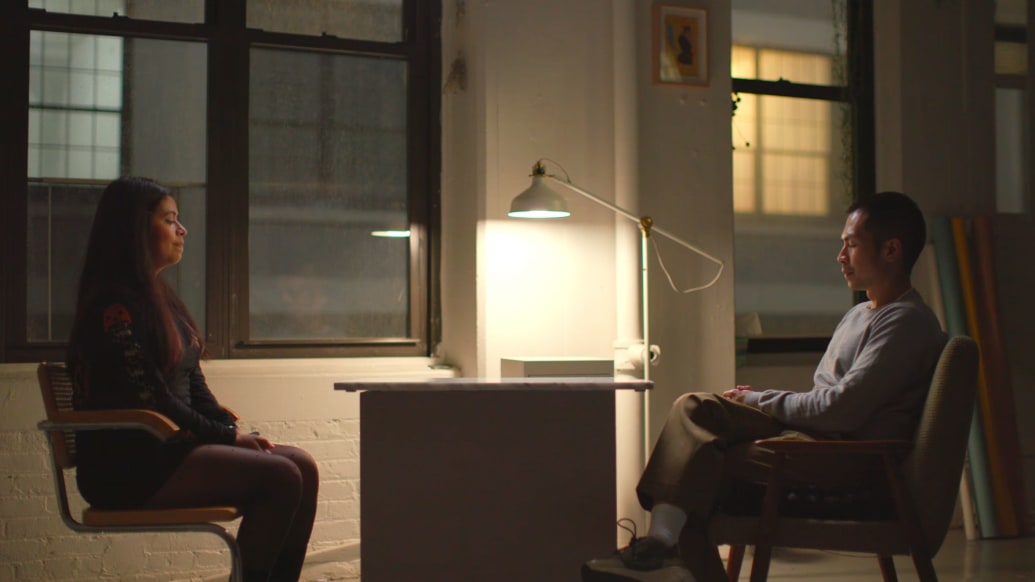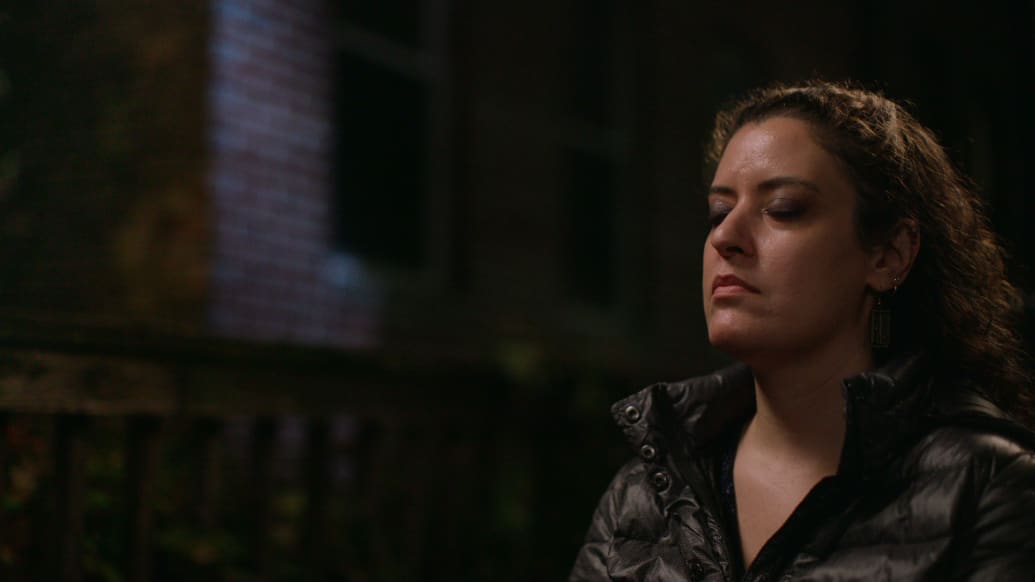Look into My Eyes recognizes that its subjects—a collection of psychics plying their trade in New York City—do not possess real supernatural powers. Nonetheless, that’s beside the point of Lana Wilson’s heartfelt and empathetic documentary, whose genuine focus is the emotional turmoil that drives people to practice this profession as well as to patronize its “experts” in search of guidance and insights into the biggest questions of their lives.
Premiering in theaters on Sept. 6 following its acclaimed debut at the Sundance Film Festival, it’s a profile of the co-dependent relationship shared by mediums and their clients, both of whom, through their meetings, seek answers, assurances, validation, comfort, encouragement, and relief from inescapable guilt and grief.
Opening with a graceful Hitchcockian shot that moves from the heavens above to a small apartment window, Wilson’s film doesn’t identify any of its speakers, only some of whose names are heard during the course of its 105 minutes. As it turns out, who they specifically are isn’t as important as the things that bind them, beginning with a shared love of the theatrical and cinematic arts.
Living in a cluttered and cramped apartment that’s decorated with movie memorabilia, Eugene talks about the correlation between screenwriting and his psychic work, and multiple other psychics also discuss their prior experiences with acting and the stage. The link between giving strangers readings and performance is underlined from the start. So too, therefore, is the notion that these supposedly paranormally empowered men and women are perpetrating a type of fiction—channeling their personal hopes, dreams, disappointments, and hang-ups through their sessions.

A still from Look Into My Eyes.
A24
Look into My Eyes’ psychics want to heal traumas at the same time that they’re grappling with (and trying to actively seize control of) their own, be it Phoebe talking about a childhood spent living in a one-bedroom apartment with a dad who did coke with her, or Per relaying how he began his career as a psychic after an earth-shattering break-up. Nikenya remembers how, upon moving from Oklahoma to New York City in 2011, she felt “ungrounded” until she attended a séance whose warmth gave her the sense of church-like community she craved.
Sherrie admits that she originally dreamed of being an artist, although her “narcissist” parents didn’t approve, which instilled in her a bedrock desire to create safe spaces for individuals. In a subsequent clip, she tells a boy suffering from “existential pressure” that “it’s okay to do what you love,” and the connection between what she needed from her parents, and what she provides to this kid, is as plain as day.
Being and visiting a psychic are paralleled in Look into My Eyes as kindred means of looking for reassurance, solace, and direction. In most cases, what the mediums dispense is merely helpful advice, as when Phoebe—who specializes in communing with animals—tells a man that his bearded dragon Bobby Jr. doesn’t want to be rescued from his new home (“That part is done”).
More frequently, however, they offer the very answers that their customers are hoping to hear, often having to do with deceased loved ones. Despite a psychic asking someone if they’re okay with uncomfortable information at the outset of the film, virtually nothing unpleasant comes out of these conversations between the living and spirit worlds; in virtually every case, those on the “other side” have nothing but heartening dispatches for those they left behind.
On a couple of occasions, Look into My Eyes’ psychics fail to do a proper reading, and Per confesses that when this happens, he has a tendency to beat himself up and question his abilities. His sincerity suggests that, instead of devious charlatans, these men and women are no different than those that pay for their services, in that they too are desperate to believe in a falsehood because it assuages their doubts and pain.
When Michael encounters a former college classmate and is asked to get in touch with her boyfriend (who took his life, and whom Michael knew), he says that her ex promises that she’ll one day return to the vocation she abandoned—which is acting. Before she leaves, Michael lets her know that he agrees with that opinion because she was talented, thereby decidedly blurring the line between message and messenger.
“Acceptance” from a community of likeminded “weirdos” is what drew many of these psychics to their vocation, and Look into My Eyes closes with a group session between them all, during which Per is given the opportunity to be on the opposite side of a reading. In this and many additional vignettes, lingering melancholy is the prevailing mood. Wilson bookends her action with a physician recounting a story—about a young gunshot victim whose life she couldn’t save—that haunts her to this day.
Later, a family’s tearful reaction to their reading (informing them that two spirits are always around them and are still “part of the unit”) indicate that they’re coping with the loss of young children. And a twentysomething black man states that he’s plagued by thoughts about a bill of sale (and, in particular, the monetary price) for his long-ago ancestor, and eager to know what it means for him.

A still from Look Into My Eyes.
A24
The scattered questions Wilson asks on camera in Look into My Eyes implies that she doesn’t take all of this at face value. Her aim, however, isn’t to critique or to ridicule but to understand and, in doing so, to put a face (or many faces) to the common feelings and impulses that bond us. Her film isn’t a mocking exposé; it’s a quirky, compassionate poem about faith, heartache, and longing, and in that regard, its fanciful elements prove to be almost peripheral.
Yes, some of the psychics’ guesses are way off the remark—as when one starts describing a Black woman’s ex-boyfriend as a Black man (she never dates them) who’s older (doesn’t ring a bell) and wears a fedora (nope!)—and there are times when these clairvoyants are more than a bit ridiculous. Mostly, though, they simply resonate as lost souls reaching out into the darkness for a hand to hold.




![Tyson Foods Plant [Photo: Food Manufacturing]](https://southarkansassun.com/wp-content/uploads/2023/08/iStock_1185520857__1_.5e441daa51cca-600x337.jpg)







![Silverado Senior Living Management Inc. [Photo: Los Angeles Times]](https://southarkansassun.com/wp-content/uploads/2023/10/download-6-4-600x337.jpg)

![China's Wuhan Institute of Virology [Photo: Nature]](https://southarkansassun.com/wp-content/uploads/2023/09/d41586-021-01529-3_19239608-600x337.jpg)
















